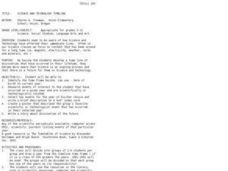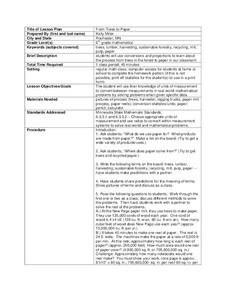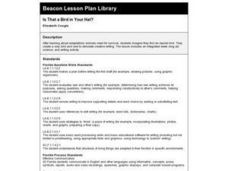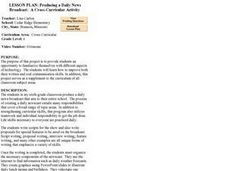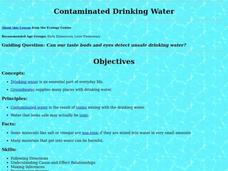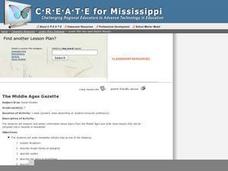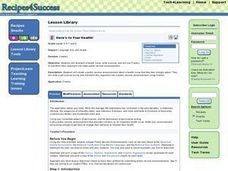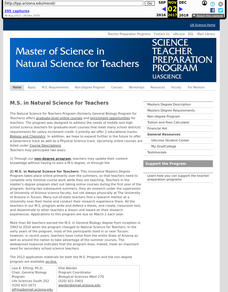National Endowment for the Humanities
Seeing Sense in Photographs & Poems
Learners analyze photographs and poetry as forms of each other. In this poetry and photography analysis lesson, high schoolers use the photographs of Alfred Stieglitz and poetry from William Carlos William to explore how poetry and...
Curated OER
Do You Haiku? We Do!
Third graders try their hands at writing Haiku, a form of Japanese poetry. Haiku is usually 17 syllables in three-line form. This engaging lesson has many excellent worksheets and website imbedded in the plan. They share their finished...
Curated OER
Design Your Dream Room
Students determine length, width, perimeter, and surface area, and work with two-dimensional representations of three-dimension objects to design and write descriptions of their dream bedrooms.
Curated OER
Storytelling in the Oral Tradition
Seventh graders research Greek mythological characters. They write about problems faced by middle school-aged children and how the character would handle them. Students also create story boards to accompany their oral narratives.
Curated OER
Science and Technology Timeline
Students develop a time line of discoveries that have occurred in their lifetime. In this time line lesson plan, students research scientifically or technologically related events of interest to them, write a brief description on a 4x6"...
Curated OER
From Trees to Paper
Sixth graders investigate logging and the process of paper making. In this forestry lesson, 6th graders analyze pictures of trees being processed into the paper they use everyday. Students solve and create math problems based on...
Curated OER
Taha Moana - The Sea
Students discuss language, meanings and ideas in a range of texts related to the sea. They write instructions, explanations, arguments and factual accounts, express personal viewpoints on topics related to the sea.
Curated OER
How does Paper Making Contribute to Economics
Second graders investigate the numerous jobs it takes to create paper in the U.S. In this economics lesson, 2nd graders discuss where paper comes from, what types of trees are needed, and how the paper milling process creates jobs and...
Curated OER
Fighting for Fair Farming
Students consider various economic terms, examine the impact of subsidies on farmers and other industries, write essays explaining the subsidy process, and illustrate through posters how subsidies affect both domestic and foreign markets.
Curated OER
Is That a Bird in Your Hat?
Second graders imagine they find an injured bird. They create a clay bird and nest to stimulate creative writing. The lesson includes an integrated week-long art, science, and writing activity.
Curated OER
Vivid Adjectives
Students review adjectives and play a game where students compete to see who can write the most adjectives for a given noun. They write a story about one topic and try to use a variety of adjectives in sequence tto describe a noun.
Curated OER
Adult Criminal Justice System
Twelfth graders examine the procedures and protections involved in processing an accused person through the criminal justice system. They view a Powerpoint presentation, conduct research, and write a paper describing a crime they have...
Curated OER
La cocina del mundo hispanohablante
Seventh graders chose a Spanish speaking country. They research the cuisine of that country. They find recipe which they word process the recipe in both English and Spanish before adding it to a class recipe book.
Curated OER
Producing a Daily News Broadcast: A Cross-Curricular Activity
Sixth graders create a daily newscast which they broadcast to the whole school. They write the scripts for the broadcast, after reviewing interviews, feature writing, and proposals. They organize the newscast for presentation and edit...
Curated OER
Contaminated Drinking Water
Students explore water and determine whether or not it is safe to drink. In this water exploration lesson plan, students are split into groups, to acts as the polluter, taster, and recorder. Students explore by placing different amounts...
Curated OER
Ice Cream Toppings
Students explore the five senses. In this senses lesson, students use their senses to top their ice cream. Students compare and contrast the different toppings and write their observations, using descriptive words, in a notebook.
Curated OER
My Symbol
Learners paint a symbol representing themselves. In this painting lesson students discuss symbols and view the Interpretive Wall. Learners write a poem to generate their personal symbol.
Curated OER
The Middle Ages Gazette
Seventh graders research and obtain information about topics from the Middle Ages and write news reports that be compiled into a Gazette or newsletter. The reports can be on feudalism, castles, jousts and tournaments and/or the Crusades.
Curated OER
Autobiographies: A Jigsaw Puzzle
Students read The Autobiography of Ben Franklin. Using construction paper, they cut out five jigsaw puzzle pieces in different shapes using the entire sheet of paper. They write events from their own lives on the puzzle pieces, thus...
Curated OER
The Rest of the Story
Third graders make predictions about the story "The True Story of the Three Little Pigs" based on background knowledge. They read the story, stopping to verify or reject predictions. They write their own opinionated fairytales.
Curated OER
Here's to Your Health!
Studets research a health issue. They write an essay about the health issue. The create a public service announcement.
Curated OER
Transportation Unit
Students maintain a journal and write about various types of transportation. In this transportation instructional activity, students write using flash cards to describe vehicles. Students listen to stories and sing a song...
Curated OER
DIY Lava Lamp
Students examine lava lamps and what causes them to work. In this density instructional activity students make a lava lamp and write the scientific explanation of what happens.
Curated OER
Spiders: An Organism for Teaching Biology
In this unit, the students explore basic ecology concepts and scientific processes using spiders as model organisms. They capture spiders, observe and care for them, and use them to answer their own questions about spider behavior....






